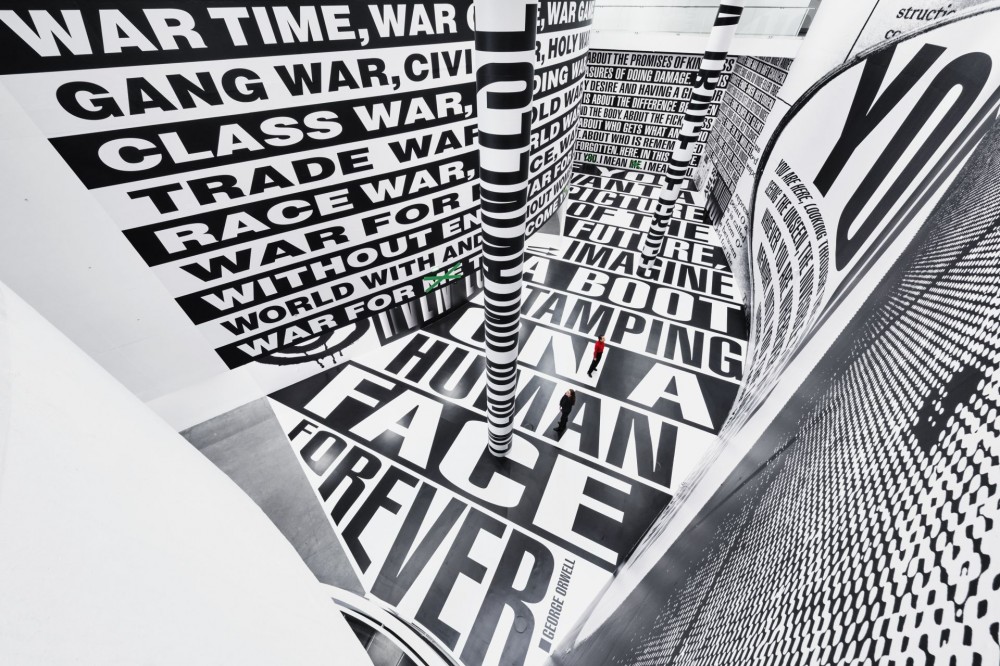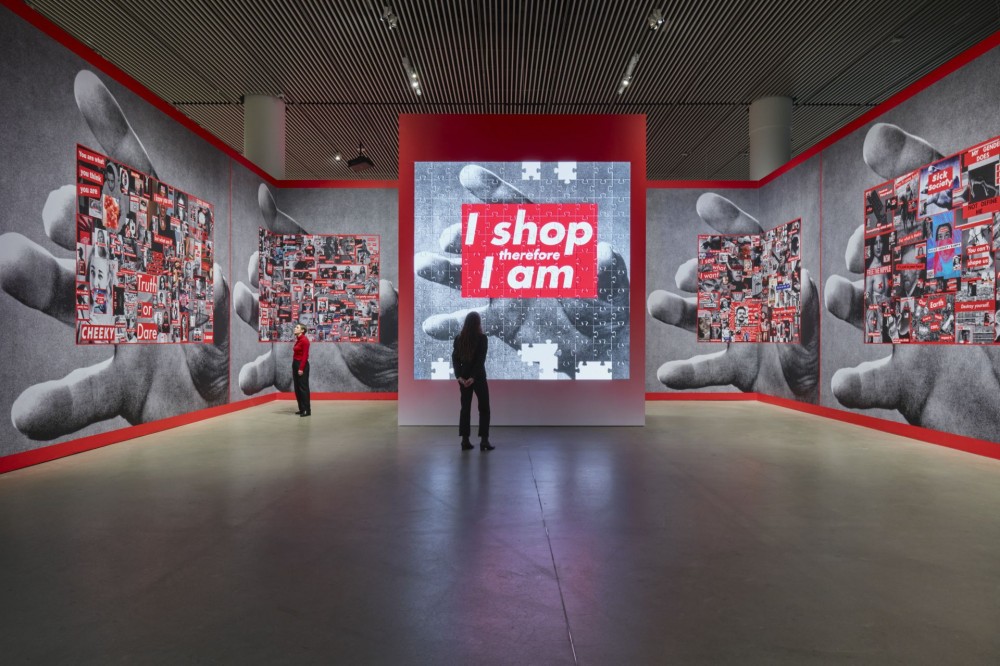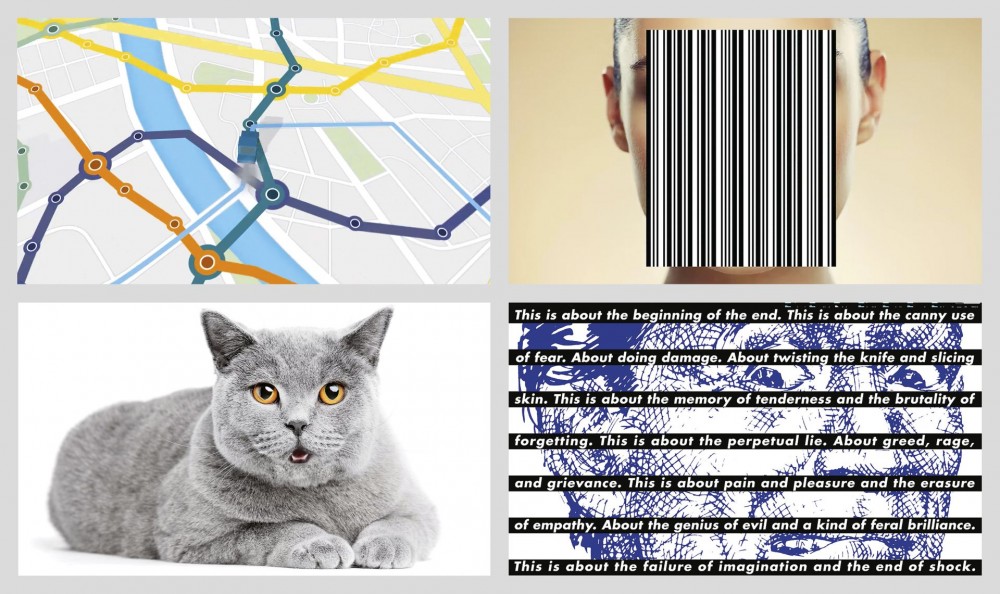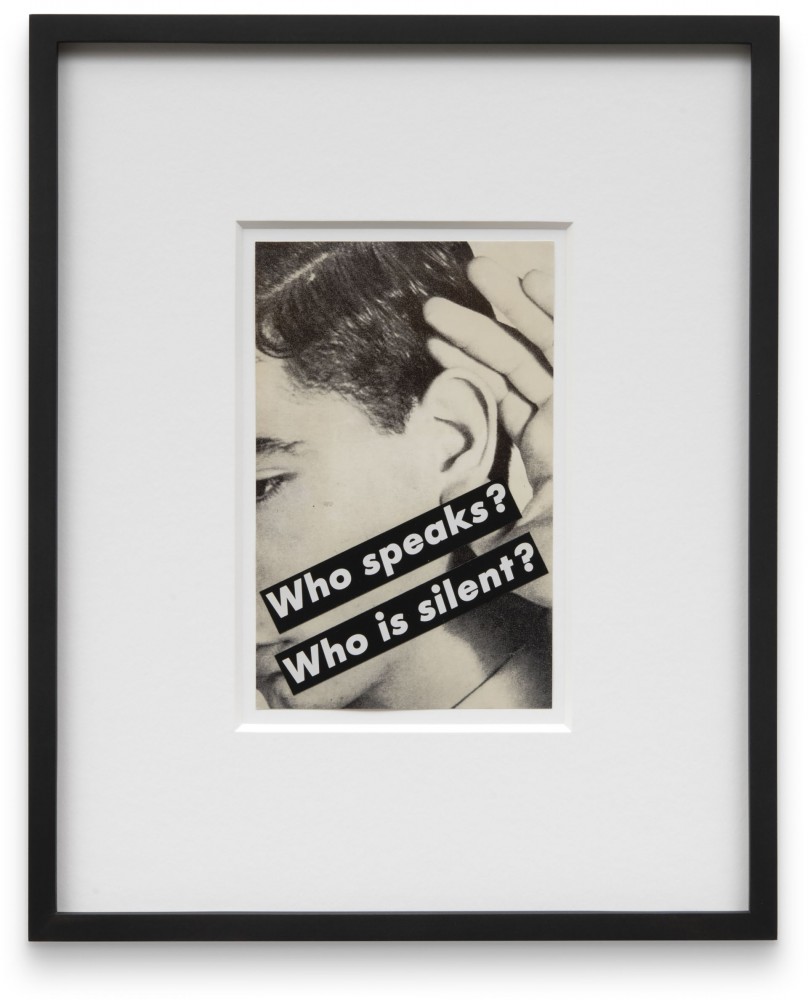
Barbara Kruger, No Comment
Installation view, ARoS Aarhus Kunstmuseum, Aarhus, November 29, 2024–April 21, 2025
Courtesy the artist, ARoS Aarhus Kunstmuseum and Sprüth Magers
Photo: Anders Sune Berg
-
Curator: Lekha Hileman Waitoller
-
Sponsor: Occident
The Guggenheim Museum Bilbao proudly presents the first comprehensive survey of Barbara Kruger's work in Spain, an ambitious exhibition that brings together over four decades of the artist's radical explorations of images, language, and power. Sponsored by Occident, Barbara Kruger: Another day. Another night. offers a profound examination of how the artist's practice—deeply embedded in mass communication and cultural commentary—continues to evolve in the digital age.
For more than fifty years, Kruger has challenged audiences to confront the structures of power that shape our identities, desires, and beliefs. With her distinctive use of bold typography, striking juxtapositions of image and text, and monumental scale, she has developed a visual language that draws from mass media while insisting on critical reflection. Speaking in the idiom of advertising yet subverting its intent, her work exposes the mechanisms of persuasion, consumption, and control that permeate contemporary life.
Kruger's distinctive aesthetic is deeply rooted in her early professional experience as a graphic designer. In the late 1960s, she worked as a page designer and picture editor at magazines such as Mademoiselle and House & Garden, where she learned to capture attention through the composition and clarity of visual information. This period shaped not only her sensitivity to how images circulate in consumer culture but also her enduring interest in the mechanisms of visual persuasion. It was during this time that she began working with sans serif typefaces—most notably Futura Bold and Helvetica Ultra Compressed—valued for their stark legibility and punch. These fonts became hallmarks of her art, allowing her to "cut through the grease," as she once put it, with declarative statements that seize space and demand engagement. Her early paste-up works—black-and-white photographic images layered with text—emerged from this design background and laid the conceptual groundwork for her later, large-scale installations. From the beginning, Kruger has treated language not only as content, but as form—a visual element as charged as any image.

Barbara Kruger, No Comment
Installation view, ARoS Aarhus Kunstmuseum, Aarhus, November 29, 2024–April 21, 2025
Courtesy the artist, ARoS Aarhus Kunstmuseum, Sprüth Magers and David Zwirner.
Photo: Anders Sune Berg
Another day. Another night is an extensive survey that charts Kruger's artistic developments over the last decades, transforming the Guggenheim Museum Bilbao's galleries into an environment where sound, text, and architecture converge—surrounding visitors in a charged encounter with the language of power. Developed in close collaboration with the artist, the exhibition revisits iconic paste-ups, while showcasing recent video and digital pieces that continue to expand the formal and conceptual scope of her practice. Expansive vinyl installations, large-scale digital works, video projections, and site-specific soundscapes deepen the sensory impact of the messages embedded in the artwork.
The exhibition opens with one of Kruger's most iconic pieces, Untitled (I shop therefore I am), originally created in 1987 as a photographic silkscreen/serigraph on vinyl and reimagined by the artist in 2019 as a large-scale LED installation (over 5 meters in height as it is installed in Bilbao), complete with animation and sound. The work unfolds like a giant puzzle—each piece locking into place until the full phrase emerges: "I shop therefore I am." Then, in a flash, the image changes, accompanied by the sound of clanking metal, cycling through variations such as "I shop therefore I hoard," "I need therefore I shop," "I love therefore I need," and others. Kruger's philosophical riffs on consumption and identity through René Descartes' famous proposition are just one example among many in the exhibition, where references to thinkers, writers, and cultural texts saturate the space.
Kruger's works draw from a constellation of sources—political speeches, advertising slogans, religious doctrine, Internet slang—transforming them into sharp, incisive reflections on the systems that shape our lives. She doesn't simply quote; she reconfigures. These fragments of text, once familiar, are pulled into new arrangements that expose their underlying assumptions or contradictions. In doing so, Kruger replaces passive consumption with confrontation, swapping out our internal monologues for hers—probing, biting, and oddly intimate. Her selections are never neutral: each phrase becomes a loaded gesture, part of a broader pattern of commentary that extends across decades of her practice. And while the formal vocabulary may appear consistent, what she reveals is endlessly shifting—her work evolving in step with the language of power, persuasion, and protest.

Barbara Kruger, Untitled (No Comment), 2020 (video stills)
Three-channel video installation, color, sound, 9 min. 25 sec.
Courtesy the artist and Sprüth Magers
That urgency feels particularly present in many of the works in the exhibition that resonate with the political and cultural tensions of the current moment. Among the standout pieces is Untitled (Forever), in which George Orwell's ominous words—"If you want a picture of the future, imagine a boot stamping on a human face—forever"—appear in monumental black-and-white text. A statement written decades ago, yet in today's political landscape, it feels disturbingly prescient. In Untitled (Verdad), the Spanish word for truth fades from jet black to pale gray, prompting reflection on the nature of truth itself—is it absolute, or does it erode over time? Meanwhile, Kruger's "Rogue Audio" installations introduce an unexpected auditory layer, with disembodied voices softly reciting phrases such as "I love you" and "Sorry", offering moments of irony and intimacy in contrast to her more declarative visual works.
A key dimension of the project is Kruger's engagement with Bilbao's linguistic and cultural context. The Basque Country offers a particularly resonant setting for her interventions. "Language is a powerful force, and it defines us," Kruger states. "It speaks of hierarchies, of adoration and contempt. And it has a very site-specific element to it, in that each place carries its own vernacular and embedded histories." This attentiveness of language's nuances and tensions is woven throughout the exhibition, reflecting the artist's ongoing commitment to exploring how meaning circulates—and is contested—across different cultural and political terrains.
A sweeping new site-specific work in Spanish in Basque called Untitled (Camino) (2025) was created with this in mind. Not only does it reference Bilbao's linguistic landscape, but it also serves as a visual thread, connecting the exhibition's various galleries, which are distributed in a meandering configuration around the museum's central atrium.
This exhibition and publication reaffirm the enduring urgency of her vision, demonstrating how her art remains a critical force in a world saturated with images, rhetoric, and persuasion. At a time when truth is contested, media is omnipresent, and language itself is a battleground, Barbara Kruger's work insists that we not simply consume—but pause, reflect, and respond.

Barbara Kruger, Untitled (Who speaks? Who is silent?), 1984
Photograph and type on paper
21.6 x 13.7 cm; 41.9 x 34.3 x 6.4 cm (framed)
Courtesy the artist and Sprüth Magers
Photo: Robert Wedemeyer

